Objects Κέντρον Ερεύνης Ελληνικής Φιλοσοφίας
<< 10
10 >>
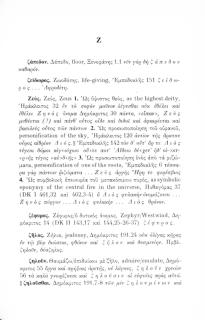
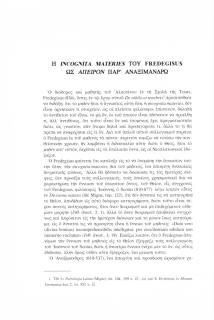
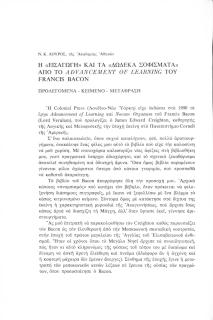
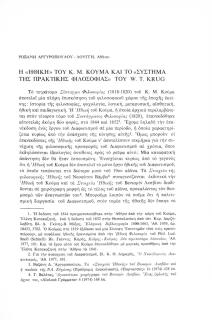
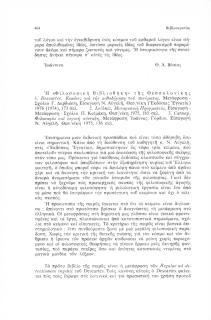
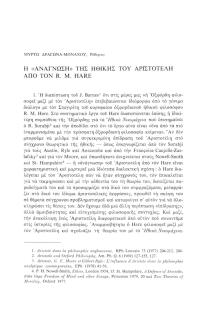
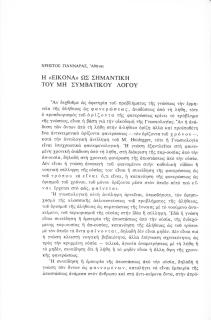
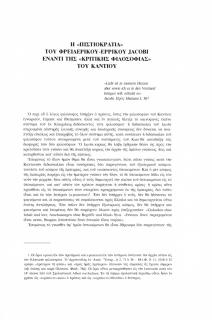
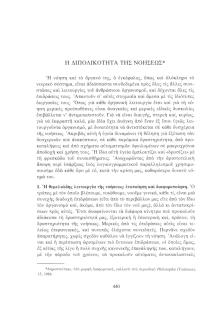
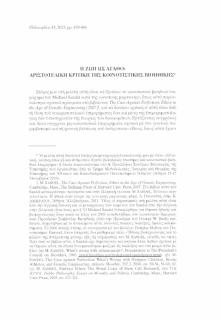
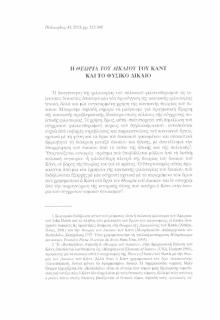
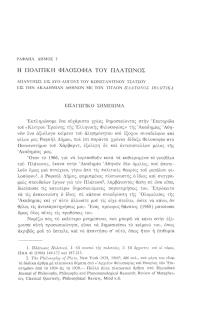 << 10
10 >>
<< 10
10 >>
Total: 4244

Ζεύς
Ενότητα: Λεξικό Προσωκρατικής Φιλοσοφίας
Ως ύψιστος θεός
Η incognita materies του Fredegisus ως άπειρον παρ' Αναξιμάνδρω
Ενότητα: Άρθρα του περιοδικού "Φιλοσοφία"
Die zwei Philosophen Fredegisus und Anaximander drücken dieselben Ansichten für den Begriff über κοσμογόνος Αρχή aus.
Η «Εισαγωγή» και τα «Δώδεκα σοφίσματα» από το Adnancement of Learning του Francis Bacon
Ενότητα: Άρθρα του περιοδικού "Φιλοσοφία"
In this article a translation in Greek of the Twelve sophisms from the Advancement of Learning (Book VI, Chapter III) by Francis Bacon is given; some comments are also occasionally added on Bacon’s life, personality and the intellectual atmosphere of his time.
Η «Ηθική» του Κωνσταντίνου Κούμα και το «Σύστημα της Πρακτικής Φιλοσοφίας» του W. T. Krug
Ενότητα: Άρθρα του περιοδικού "Φιλοσοφία"
K.M. Koumas (1777 – 1836), ein Vertreter der neugriecischen Aufklärung, hat ein vierbändiges Kompendium der Philosophie, sein Σύνταγμα Φιλοσοφίας genanntes Hauptwerk (Wien 1818-20), publiziert. Seine Ethink, die im vierten Band enthalten ist, steht unter dem Einfluß der Philosophie Kants und ist abhängig von W.T. Krugs System der praktischen Philosophie, Teil II: Tugendlehre (1818). Trotz der Bemühungen um eine selbständige Konzeption seines Werkes hat Koumas vieles von Krug übernommen, so den kantischen Terminus des Kategorischen Imperativs und die kantische Unterscheidung zwischen Maxime und Gesetz. Ferner stoßen wir auf die Definition er Ethink als Tugendlehre, Pflichtenlehre und Asketik und die des Gewissens als ursprünglicher Grundlage der Sittlichkeit. Auch Koumas‘ Lehre von der Glückseligkeit und Vollkommenheit ist die, welche man in Krugs Werk findet, wie auch die Charakterisierung des Weltbürgers als Idealtyps menschlicher Tugend in jenem Kopendium steht.
Η «Φιλοσοφική Βιβλιοθήκη» της Θεσσαλονίκης 1. Descartes. Κανόνες για την καθοδήγηση του πνεύματος. Μετάφραση, Σχόλια Γ. Δαρδιώτη, Εισαγωγή Ν. Αυγελή, Θεσ/νίκη (Εκδόσεις Εγνατία) 1976 (1974), 173 σελ. 2. Leibniz, Θεσ/νίκη 1975, 185 σελ. 3. Carnap Φιλοσοφία και λογική σύνταξη, Μετάφραση Ιωάννας Γόρδου, Εισαγωγή Ν. Αυγελή, Θεσσαλονίκη 1975, 136 σελ
Ενότητα: Άρθρα του περιοδικού "Φιλοσοφία"
Δεν υπάρχει περιγραφή
Η «ανάγνωση» της ηθικής του Αριστοτέλη από τον R.M. Hare
Ενότητα: Άρθρα του περιοδικού "Φιλοσοφία"
The claim that nowadays Oxford is doing philosophy along with Aristotle can also be defended by the impressive and substantial presence of Aristotelian stances in the systematic work of the eminent moral philosopher R. M. Hare. In Hare΄s three influential books, covering thirty years of continuous elaboration of the theory of «rational universal prescriptivism», the view is moreover verified that the Nicomachean Ethics is a philosophical piece of work especially favourite at Oxford as «a text most in harmony with recent Oxford philosophy». Hare quotes Aristotle frequently and his references to him exceed in number those to all other ancient and modern philosophers. His well known meta-ethical theory can be viewed as a successful synthesis of the ethics of Aristotle, Hume and Kant with utilitarianism, and a translation into the modern idiom of traditional ideas in the analytic style. Although we should not speak of a certain influence exerted by Aristotle on Hare, as is the case with other analytical philosophers, Hare΄s reading of Aristot...
Η «εικόνα» ως σημαντική του μη συμβατικού λόγου
Ενότητα: Άρθρα του περιοδικού "Φιλοσοφία"
La conception du temps comme horizon où apparaissent les étants, nous conduit obligatoirement à une Gnoséologie phénoménologique. Nous comprenons la vérité (α-λήθεια) des étants comme une manifestation et la manifestation comme temporalité. La conscience du temps c'est la condition nécessaire et suffisante de l'émergence des phénomènes. Malgré sa rélativité la vériié comme manifestation se rend objective par la fonction ((sémantique» de la langue. Les limites de la connaissance coincident avec les limites de la langue. La conception d' une notion (concept- signifié) devient possible seulement dans sa liaison avec son image acoustique (signifiant). L' objectivation des notions par la parole manifeste le caractère conventionnel de la connaissance et aussi l' affirmation absolue d' un système de signes distincts correspondants à des idées distinctes. D' autre part, la conception de la personne comme horizon où apparaissent les étants, nous conduit à une conception de la connaissance comme exprérience d΄une relation de la personne avec les é...
Η «πιστιοκρατία» του Φρειδερίκου-Ερρίκου Jacobi έναντι της «κριτικής φιλοσοφίας» του Κάντιου
Ενότητα: Άρθρα του περιοδικού "Φιλοσοφία"
Δεν υπάρχει περιγραφή
Η Διπολικότητα της Νοήσεως
Ενότητα: Άρθρα του περιοδικού "Φιλοσοφία"
Δεν υπάρχει περιγραφή
Η Ζωή ως Αγαθό: αριστοτελική κριτική της κοινοτιστικής βιοηθικής
Ενότητα: Άρθρα του περιοδικού "Φιλοσοφία"
Δεν υπάρχει περιγραφή
Η Θεωρία του Δικαίου του Καντ και το Φυσικό Δίκαιο
Ενότητα: Άρθρα του περιοδικού "Φιλοσοφία"
La Doctrine du Droit (Rechtslehre) de Kant est une conjonction du droit et de la démarche critique qui renouvelle la problématique de la philosophie du droit. La conception du droit naturel comme œuvre de la raison pure repose sur des principes à priori et sur la catégorie fondamentale de loi et aboutit à une transformation profonde du droit naturel. La distinction entre le droit naturel comme droit privé et le droit public se manifeste dans l' analyse de la possession intelligible et découle de l' inefficacité du droit naturel. La disjonction du droit et de la morale se rapporte à celle de l' état et de la société et mène dans la subsomption du droit naturel sous le droit politique. Toute la théorie du droit naturel est justifiée par l' État dans lequel le droit trouve son fondement. Ainsi la théorie kantienne du droit est eloignée des théories jusnaturalistes du droit et Kant peut être considéré comme précurseur du positivisme juridique. Mais la division du droit en droit privé et droit public fonde une doctrine normativiste du droit qu...

